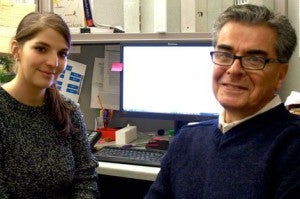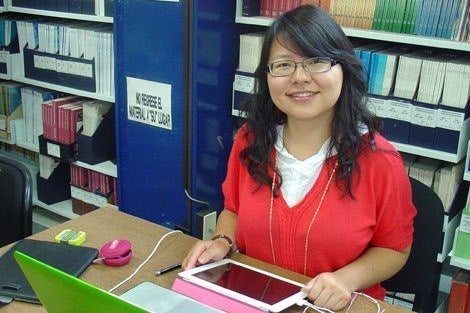December 13, 2013 — Under an academic exchange program between Harvard School of Public Health (HSPH) and the Mexico National Public Health Institute (the Instituto Nacional de Salud Publica, or INSP) that began in January 2013, four HSPH students have studied and conducted research in Mexico and two INSP students have done the same in Boston.
Lu Zhang, a second-year doctoral student in aging epidemiology in the Department of Global Health and Population, spent the summer in Cuernavaca, Mexico analyzing the relationship between frailty in older adults and aspects of their living situations, such as their income level or how easy or difficult it is for them to access medical or other services.
“Being in Mexico gave me a chance to see how elderly people actually live there,” said Zhang. “For example, the area I was living in was a bit hilly, and most of the sidewalks had major cracks and were not smooth. This would be a very dangerous neighborhood for frail older adults, who are at high risk for falls. On the other hand, I was also able to learn about Seguro Popular (Mexico’s national health insurance program) and the types of services that Mexico has to help its older population.” Zhang said being in Mexico helped give her “a much better understanding of the problems than mere statistical analysis.”

Cindy Hu, SM ’14, a master’s student in the HSPH Department of Environmental Health, worked on two research projects in Cuernavaca. One examined the association between fish consumption, prenatal mercury exposure, and children’s neuropsychological behavior in a community near Lake Chapala.
Hu’s other project looked at child obesity and the built environment in Mexican urban areas. She said her experience in Cuernavaca taught her to “never be terrified of crossing the language barrier if your research needs you to do so. Cross-cultural communication is essential for 21st century public health practitioners.”
In August, Hu worked alongside Mexican student Lucia Hernandez, a research student in human nutrition at INSP, on the child obesity study. They analyzed data on children’s body mass index, families’ socioeconomic status, the neighborhood’s food environment, and barriers to physical activity.
Then, in the fall, Hernandez traveled to HSPH, where she analyzed data from a variety of field studies conducted in Mexico on unhealthy food environments near elementary schools. She worked with [[Enrique Cifuentes]]—former researcher at INSP, research scientist at HSPH since 2010, and HSPH’s faculty coordinator for the HSPH-INSP collaboration—on a proposal to expand the childhood obesity study to additional cities in Mexico. She also drafted research papers on health policy aspects of the childhood obesity issue, which she plans to submit to journals.

Another Mexican student who studied at HSPH over the summer—Adriana González Delgado, a master’s student in public health at INSP—said that participating in the exchange helped her expand the scope of her dissertation, which is focused on food security from a human rights and public health perspective.
Memorandum signed
The collaboration between HSPH and INSP was solidified in November 2012, when HSPH Dean Julio Frenk and Mauricio Hernandez Avila, Director General of INSP, signed a memorandum of understanding. The agreement between HSPH and INSP formalized longstanding ties between the two institutions.
Under the collaboration, HSPH and INSP students and faculty can take courses and conduct research at each other’s institutions, giving them a cultural immersion experience as they focus on global health challenges in areas such as aging, urban health, injuries, food security, childhood obesity, and chronic diseases. The program also facilitates faculty research collaborations, exchanges, and the possible development of joint research projects and academic programs.
“The program gives students the opportunity to gain first-hand experience in all phases of a research project, from the development of a proposal to project implementation to reporting findings to translation of new evidence into practice,” Cifuentes said. “They are learning about public health practice, rather than just theory.”
photos courtesy Enrique Cifuentes and Cindy Hu
